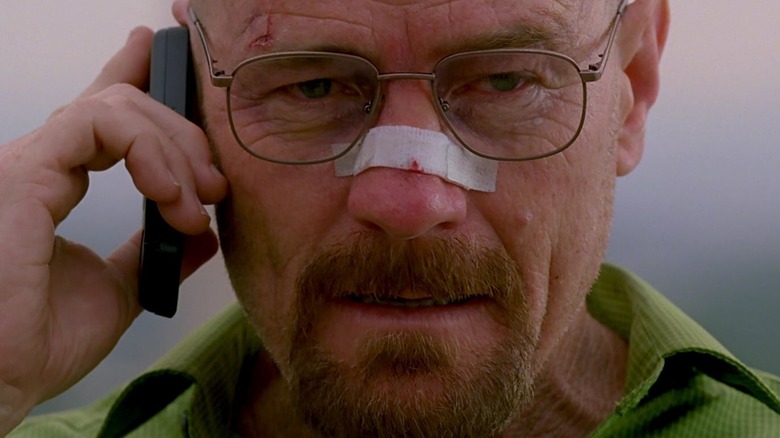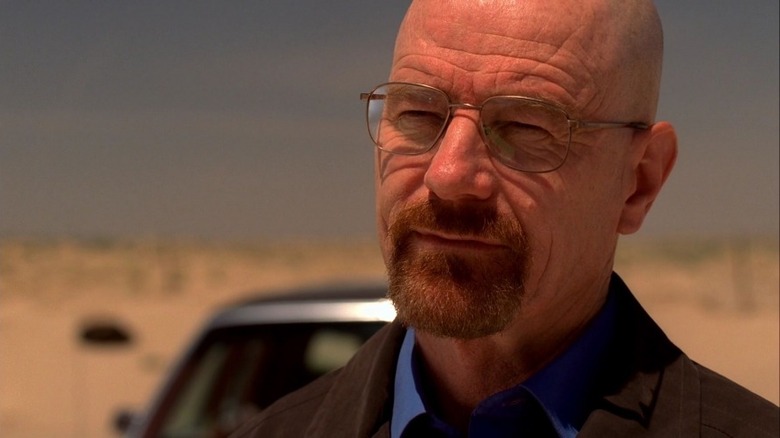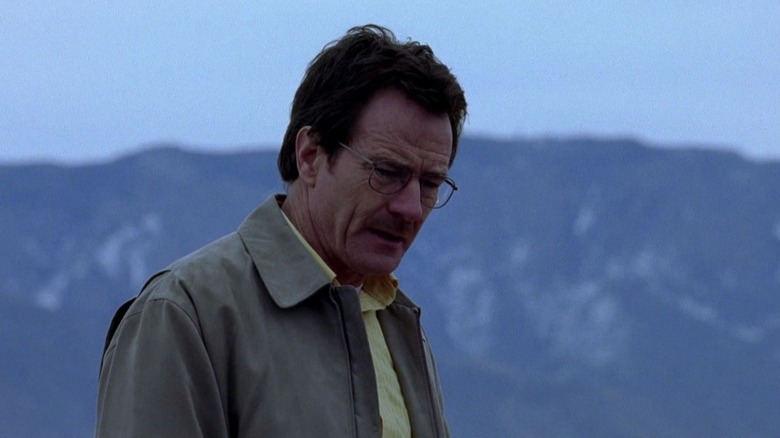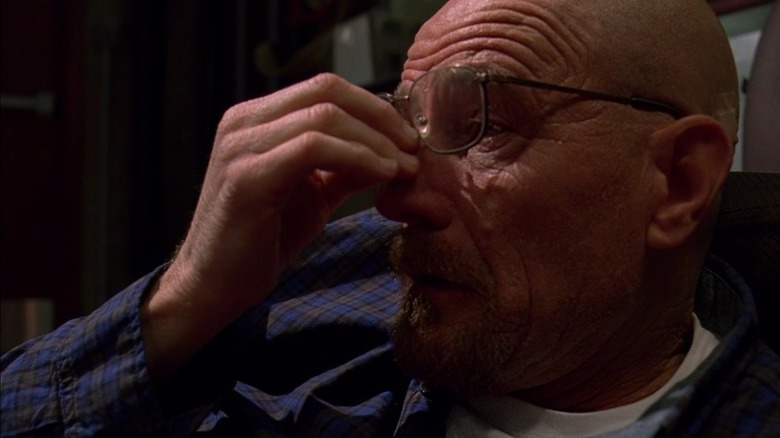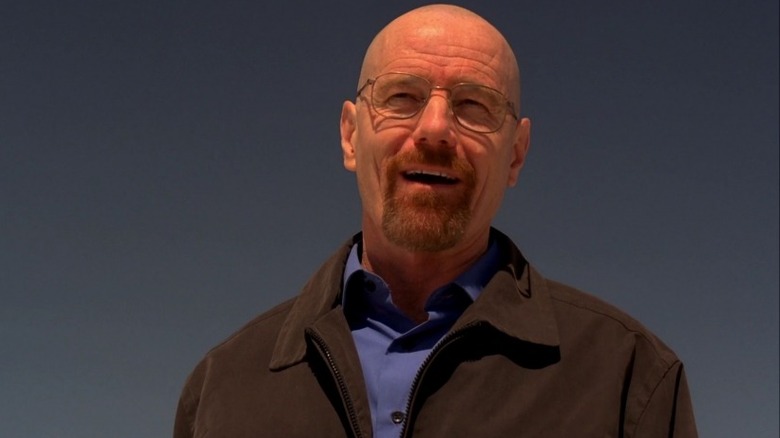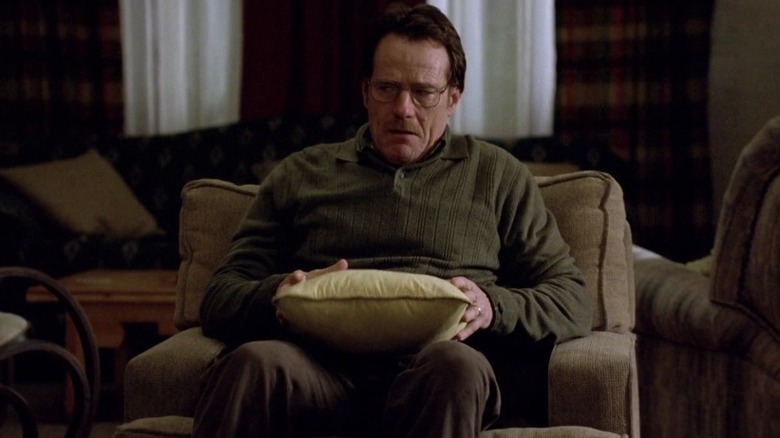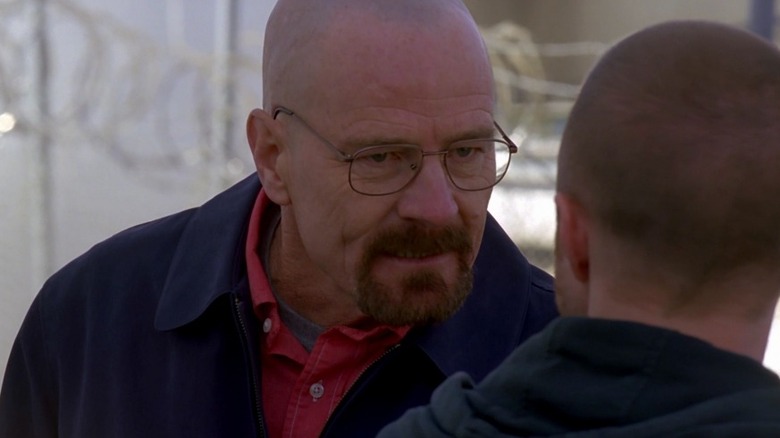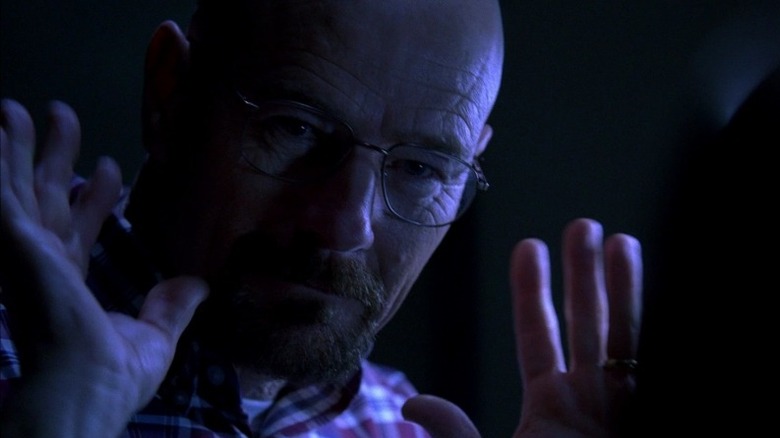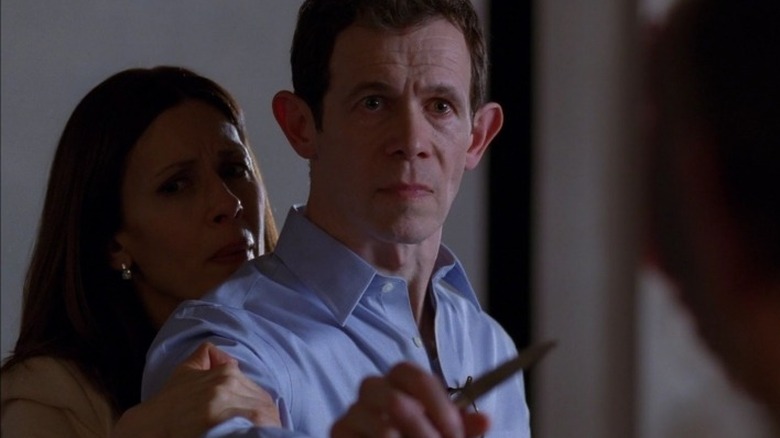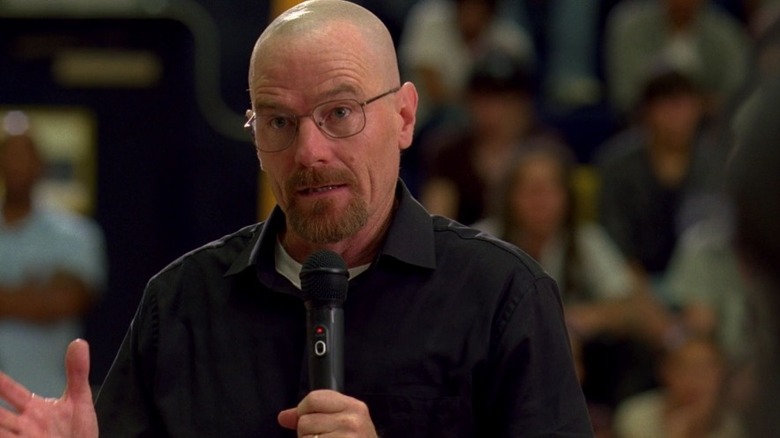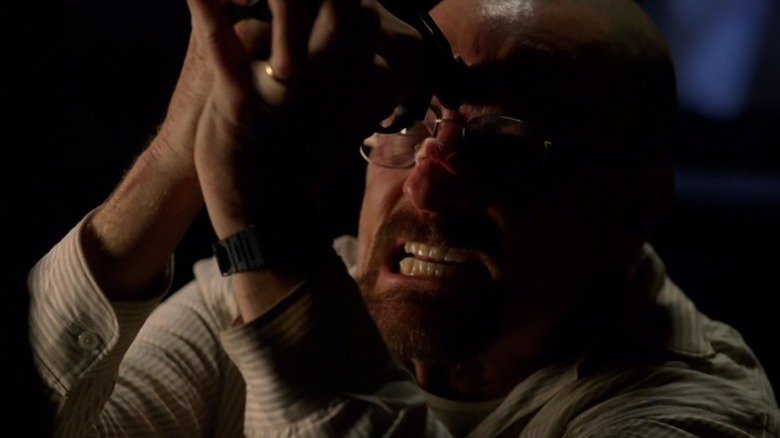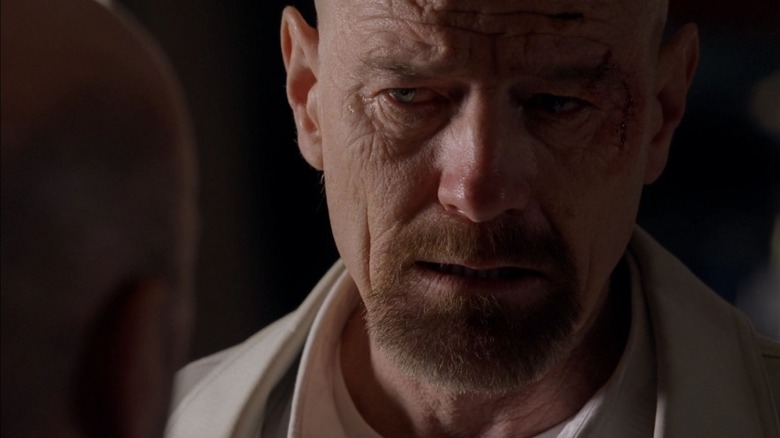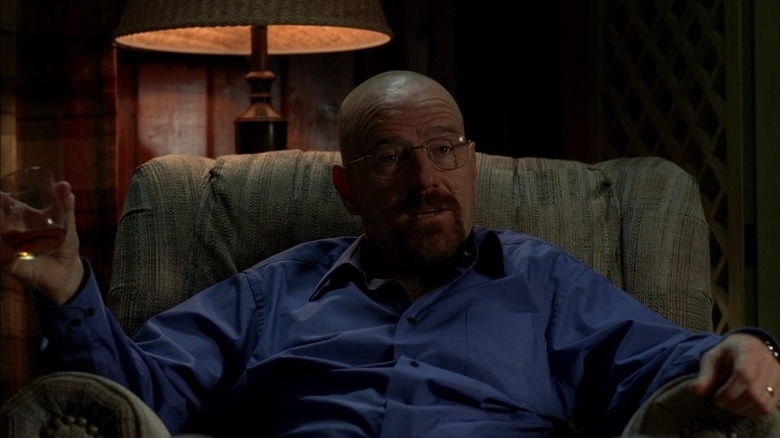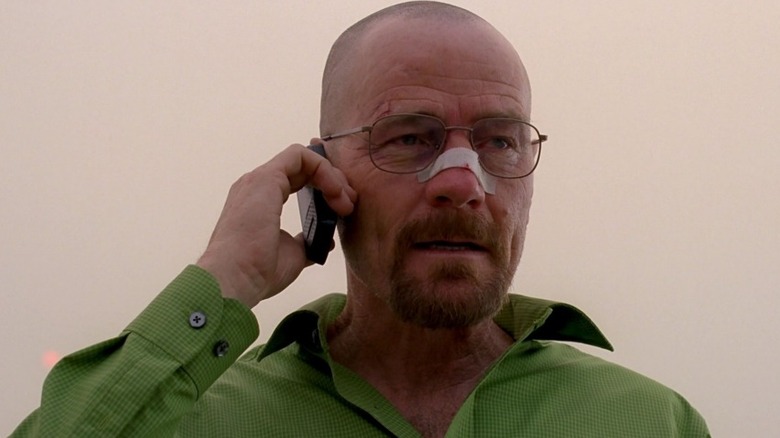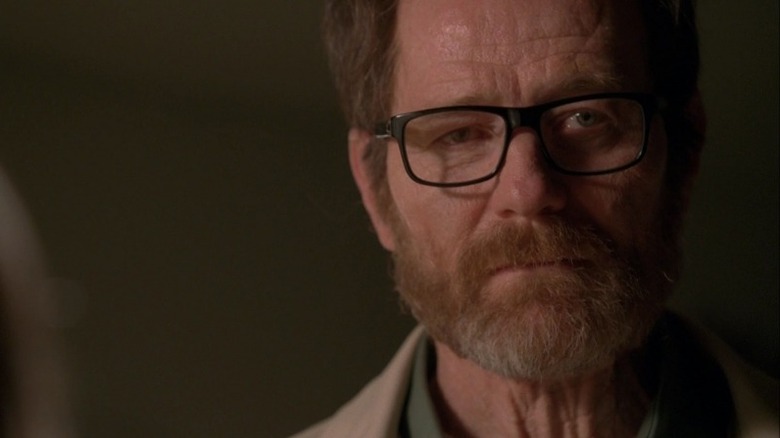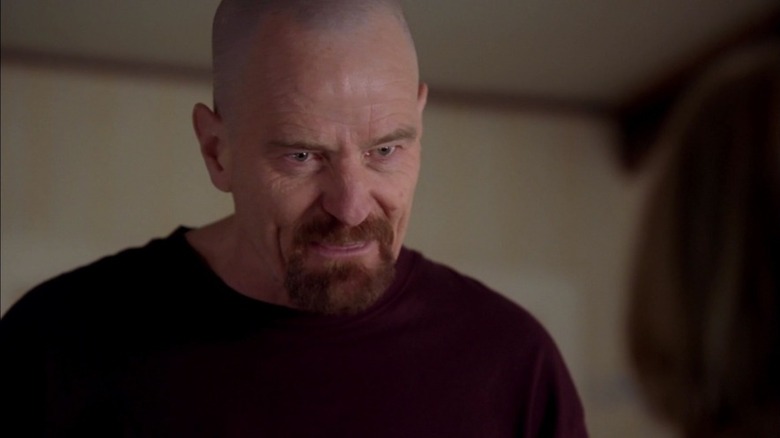The Most Memorable Walter White Quotes In Breaking Bad
We love "Breaking Bad," and — sometimes to everyone else's dismay — we love quoting it too. Do we know this kind of thing can be annoying, especially if the people around us aren't super-fans? Yes. Are we letting that stop us? Apparently not.
Luckily, when it comes to catchy, memorable dialogue, "Breaking Bad" gives us plenty of good material. Even if we narrow our scope down to just Walter White lines, we're spoiled for choice. Walt's dialogue also gets more quotable as he goes along because he's a man turning into a legend. He wants to be Heisenberg, the semi-mythical figure in the black hat, and he gets better and better at pitching that image and living up to it — no matter how much blood it leaves on the floor.
We've got variety, though. In addition to badass boasts and pithy declarations, Walt also shows a definite gift for elaborate mind games and rationalizations to let himself off the hook. Once or twice, he even has moments of poignant realization. Let's revisit some of the lines he etched into pop culture consciousness for good. Warning — there are spoilers below.
Say my name
In a way, "Breaking Bad" is the story of high school chemistry teacher Walter White becoming supervillain Heisenberg. Per NPR, that's even how creator Vince Gilligan pitched the show: "You take Mr. Chips and turn him into Scarface."
The actual execution is a little more complicated than that, both psychologically and dramatically, but Gilligan's pithy, funny pitch is spot-on for how Walt sees his own journey. All you have to do is add in one all-important detail: Walt likes turning into Scarface. It's a huge ego boost. We see that a lot over the course of the series, but one of the best and most revealing moments is when he pushes his new distributor, Declan, to realize who he is. "I'm the cook," Walt says. "I'm the man who killed Gus Fring. ... That's right. Now say my name." When Declan finally acknowledges him as Heisenberg, Walt's answer is a kind of gratified snarl: "You're g*****n right."
Walter White is dead. Long live Heisenberg.
We start tomorrow
They say a journey of a thousand miles begins with a single step. It's a lesser-known proverb that the meteoric rise and fall of a meth empire begins with acquiring an RV.
For the first two seasons of "Breaking Bad," Walt and Jesse's mobile meth lab is a key part of the show. After telling his new partner, Jesse Pinkman, to "buy the RV; we start tomorrow" in the pilot, it becomes as iconic to Walt as it is to us. In Season 5, he even reminisces about it with real warmth. It's a reminder of how all this got started. Of course, even if Walt wants to compartmentalize his life, we know that "all this" includes a gruesome amount of bloodshed and a whole host of ruined lives. The RV signifies the start of that too.
By Season 3, this line takes on an additional twist. Jesse, we learn, didn't buy the RV — at least not legitimately and for a fair price, the way Walt assumed. Jesse blew most of the money, and his friend, Combo, had to steal the RV from his own mother and sell it to Jesse on the cheap. It's still more proof that as much as he wants to, Walt can't control everything. Things on "Breaking Bad" have a way of getting out of hand.
That would have been perfect
Initially, Walt wants to rack up a sizable nest egg for his family and die with them none the wiser, but everything happens so close together — with consequences springing up all over the place — that his plan gets left in the dust. Getting out of one sticky situation keeps requiring him to either come clean or get in even deeper ... and he doesn't want to come clean.
By Season 4's "Fly," Walt's endless escalation has led to him being trapped in the purgatory of Gus Fring's meth lab. He's exhausted and paranoid, and he knows that he's lost control of his own life. Over the course of a claustrophobic episode, he wistfully talks to Jesse about when he "should have" died. What exact moment would he have had both enough money and his family's love and trust? It's then he realizes the perfect point in time — the night of Jane's death, before he crossed paths with Jesse's girlfriend.
"Oh, if I had just lived right up to that moment," Walt says, "and not one second more. That would have been perfect." While the show keeps us on edge by dangling the possibility that Walt's out-of-it rambling may lead to him confessing his part in Jane's death, it provides a genuinely poignant monologue that showcases both a bit of genuine regret on Walt's part and his tendency to believe that if he just rationalizes something enough, he'll make it all okay in the end.
Do you really want to live in a world without Coca-Cola?
In Season 5's "Say My Name," during a showdown with Declan, Walt uses his arrogance like a weapon.
Declan turns up expecting to take possession of the methylamine. Instead, he gets told Walt's keeping it — and oh, by the way, Declan should get rid of his own meth cook and agree to act solely as Walt's distributor. Walt's ultimately offering him a pretty good slice of the pie, but his argument depends on Declan conceding that not only is Walt's product vastly superior to his own, it's also so good that Declan would be doing the world a disservice if he just killed Walt, Jesse, and Mike and enjoyed his newfound monopoly.
Seriously, think about making this speech to a man who could kill you in a split second: "It's grade-school tee-ball versus the New York Yankees. Yours is just some tepid, off-brand, generic cola. What I'm making is Classic Coke. ... Do you really want to live in a world without Coca-Cola?" It's such an audacious approach that it should be a bluff, but Walt believes it so thoroughly that it probably doesn't qualify.
All right, I've got the talking pillow now, okay?
When Walt's feeling like a hapless and put-upon schmuck, acting out bits of petty revenge, or just dealing with the whiplash of going from meth and shootouts to pleasant suburbia, he can act aggrieved and tightly wound, and Bryan Cranston's superb comedic chops let these scenes develop in some memorably (and often darkly) hilarious ways.
Our number one slot for "Walt vs. ordinary life" belongs to Season 1's "Gray Matter," where an "intervention" to convince Walt to go through chemo comes with a "talking pillow," like the event is a kindergarten show-and-tell. It's ridiculous, and it hits a comic high when Walt takes another stand for his decision to not seek treatment. It's moving — except for the part where he insists everybody shut up because "I've got the talking pillow now, okay?" We're pretty sure a frank, heart-wrenching conversation about someone's potential last days should start with more dignity than that.
No, no, this whole thing — all of this — it's all about me!
This scene in Season 4's "Cornered" is one of the show's most brilliant comedic beats. When Walt tears into Jesse's story about saving Mike from an attempted robbery, the dialogue nails two fundamental truths of Walter White's character: He's a genius ... and he's a self-centered jerk who often says the wrong thing.
The thing is, everything Walt says here is absolutely right. Gus is deliberately engineering a situation where he pulls Jesse close to him and builds him up. He's looking to get rid of Walt and make Jesse into his replacement chemist, and he knows that the best way to earn Jesse's loyalty is to make him feel genuinely useful and valued.
You know what isn't the best way to handle Jesse, Walt? Telling him that one of his biggest, most self-esteem-boosting triumphs was completely engineered and that any respect he's getting from it is just a trick because he doesn't matter: Only you do. Of course, Walt has never been one to handle these situations with tact, prompting him to shout, "No, no, this whole thing — all of this — it's all about me!" There are very few times when you should insist that something is all about you ... even if it is.
You got me!
"Breaking Bad" has a lot of brutal dramatic irony, but one moment tops them all. When Hank Schrader is sorting through some laboratory notes that the dearly departed Gale Boetticher left behind — and Walt is keeping a watchful eye on the proceedings — he finds that Gale's records come with a dedication: "To W.W. My star, my perfect silence." Hank jokingly tosses out some names — "Woodrow Wilson? Willy Wonka?" — before he lands on one that he thinks is just as ridiculous: "Walter White?"
There's a breathless silence where we have to wonder if Hank will suddenly realize how all the pieces fit together ... and then Walt perfectly defuses the tension. He chuckles, raises his hands, and says, "You got me!" It's a pitch-perfect moment — the joke that isn't a joke at all. No wonder Hank flashes back to Walt's playful confession in Season 5, when the truth finally blindsides him. In retrospect, it must be infuriating.
You'll need a bigger knife
The last season of "Breaking Bad" is dark. That's why we need little bits of levity like this line, which comes in the show's finale.
Over the course of the series, Gretchen and Elliott have represented Walt's road-not-taken — the wealthy, professionally respectable life he could've had if he hadn't sold away his shares in their co-owned company in a fit of pique. Walt was never willing to take their money, but by the end of the show, he's thought of another way to use them. In order to explain his plan — and threaten them until they comply with it — he breaks into their pristine, comfortable home. He's the now-infamous Heisenberg, drug lord and murderer, right there in front of them ... and a startled Elliott grabs a paring knife to try to fend him off.
After everything Walt has faced at this point, we know that's not going to do it, prompting him to dryly quip, "Elliott, if we're gonna go that way, you'll need a bigger knife." Walt's wry reaction gets a laugh out of us every time.
Look on the bright side
Walt inadvertently causing a plane crash makes for an apocalyptic ending to "Breaking Bad" Season 2. It also makes for an amazing and deliciously cringeworthy speech in the Season 3 premiere.
Faced with the prospect of offering consolation and guidance to a whole gym full of high school students peripherally affected by the tragedy, Walt has nothing to draw on but a deep well of attempted self-justifications. He's eager to convince himself that, as far as plane crashes go, this one wasn't really that bad. It's only the "50th-worst air disaster" in terms of casualties, so maybe we shouldn't make a fuss about it. "I guess what I would want to say is to look on the bright," he urges his audience, adding, "First of all, nobody on the ground was killed, and that — I mean, an incident like this over a populated urban center — that right there, that's — that's just gotta be some minor miracle."
This isn't one of Walt's best arguments, but it is one of his most memorable.
It's you
We definitely don't endorse poisoning children (or anyone else, for that matter) — and we might even say that a couple more times for legal purposes — but we can't argue with the sheer dramatic impact of Walt poisoning Brock at the end of Season 4. It's all part of his diabolical plot to win back Jesse and get rid of Gus for good ... and it's a plot that involves a furious Pinkman storming into Walt's house, pistol in hand, demanding answers.
Walt feigns innocence, and for a while, it works on us as well as it does on Jesse because Walt is smart enough to present the illusion that he's uncovering the real story. He didn't poison Brock — Gus did, and he's framing Walt so Jesse will gun his former partner down. As Jesse aims his revolver at Walt's head, the meth cook lays it all out, saying, "I've been waiting all day for Gus to send one of his men to kill me, and it's you."
His claim that Gus poisoned Brock to set him up makes complete sense, and it ostensibly saves Jesse from being played. Jesse doesn't think to look for another layer of manipulation, and neither do we. It's twisted, cold-blooded, and masterfully effective, resulting in a truly killer scene. When Walt "realizes" that Gus set Jesse up to kill him, it feels like a genuine epiphany. On a rewatch, knowing it's basically scripted in advance makes it even better.
Tread lightly
Hank's confrontation with Walt in Season 5's "Blood Money" is one of the show's most excruciatingly tense scenes. We know that Hank has discovered everything, and we know that Walt is on edge. Watching them circle around each other, talking politely about whether or not Hank ate some bad potato salad, builds the suspense to unbearable levels.
Then it shatters ... sort of. Hank punches Walt and lays out everything he's put together, but for a while, Walt holds onto a thin veneer of plausible deniability — he doesn't act like an innocent man, but he insists that Hank could never prove anything and that even if Hank could, the cancer means Walt will be dead in six months anyway. Why wreck their family over this when the problem's going to solve itself? Hank doesn't know how to deal with the steeliness Walt's showing all of a sudden. "I don't know who you are," he says wonderingly. "I don't even know who I'm talking to."
At that, Walt drops the pretense, and an already-great scene becomes sublime. It's Walt burning this bridge forever, showing Hank who he really is in a way he can't take back: "If that's true — if you don't know who I am — then maybe your best course would be to tread lightly." We get shivers just thinking about it.
I'm in the empire business
After his victory over Gus Fring, Walt is no longer the underdog. He gets his first real taste of immense and unfettered control here, and he likes it way too much to want to walk away — even with $5 million on the table. Jesse, on the other hand, is worn out by the constant violence of their lives, and he desperately wants to talk Walt into selling their methylamine stock.
"Are we in the meth business or the money business?" he asks Walt, and it's obvious what he thinks the answer should be. Money is the end goal, and they should take the win. Unfortunately, all Walt can see is that life owes him the success and power he missed out on with Gray Matter, and now that he has a second chance, he's going to seize it.
We're haunted by his confident, arrogant declaration that his aims are bigger and more cold-blooded than Jesse ever dreamed: "I'm in the empire business." Jesse's quiet revulsion speaks volumes.
I won
One of the best lines on "Breaking Bad" is also one of the simplest. That's what makes it so powerful.
The show makes it easy to step inside Walt's POV. We know exactly how much danger he's in from Gus, and we know that Gus has him outmatched on almost every level. Honestly, when Walt pulls off his risky, unbelievable assassination via Hector Salamanca and we learn exactly why this episode is called "Face Off," it's incredibly satisfying.
Then the show pulls the rug out from under us by reminding us of how all this looks from the outside. Walt's wife, Skyler, is reeling from news of a nursing home bombing that killed two people, and the most her husband can really say to her about it is a dismissively triumphant "I won." He did win — and the second he did, all of this started feeling like a game to him, one that he didn't need to feel remorse or horror about. This is where we start really learning that Walter White is more dangerous than ever when he's on top.
I did it for me
In Season 5's "Felina," Walt finally gives up on five seasons of obsessive self-justification and admits to Skyler what she realized a long time ago: He broke bad — and kept breaking worse and worse — because he got a rush from the power. "I did it for me. I liked it. I was good at it. And ... I was ... really ... I was alive." In other words, after years of feeling like he'd seen his genius go to waste and all his chances for success pass him by, he got to be on top.
Walt scrapes up a few bits of redemption in the show's finale — in particular, he rescues Jesse from nightmarish forced labor in a meth lab — but there's something especially transcendent about this moment of clarity and confession. Walt has lied to himself and everyone else around him for a long time, and he's clung to the belief that he's a hero. Finally telling Skyler the truth hits deeper than any apology could, and it feels far more real.
I am the one who knocks!
What makes "I am the one who knocks" arguably the single most iconic, quotable Walter White line ever? We would argue that its glory comes from the fact that, out of context, it sounds really weird. "The One Who Knocks" could easily be the haunting name of some fantasy boogeyman or harbinger of death. Of course, we get the real meaning from Walt's whole impassioned speech, where he overturns Skyler's idea that he's just like Gale. "Who are you talking to right now?" he asks. "Who is it you think you see? ... I am not in danger, Skyler. I am the danger! A guy opens his door and gets shot, and you think that of me? No. I am the one who knocks!"
There are great layers here. We know that Walt is almost confessing to his part in Gale's death, even if Skyler doesn't. He didn't kill Gale himself, but he sent Jesse to pull the trigger. On the other hand, we also know that Walt is in danger, and we know he knows it too. In short, this quote is an irresistible blend of irony, specificity, heightened drama, and strangeness, all wrapped up in some top-notch Bryan Cranston acting.
